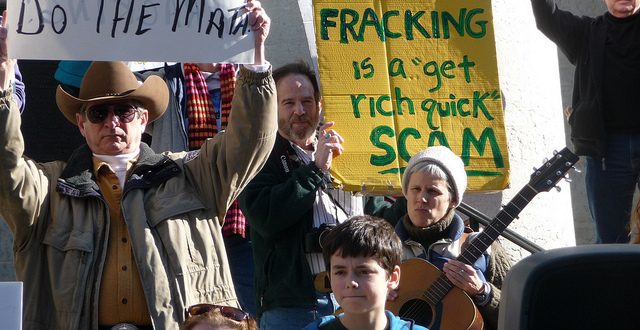The US fracking bubble that was going to power America for a century is fast receding into the history books. But unlike previous oil booms and busts, this one looks like being the last. And now that it is over, we can begin counting the costs to communities across the oil patch states.
In an essay for E and E publishing, Mike Lee sets out some of the impacts of the crash in oil and gas prices on communities at the heart of the fracking bubble:
“When lawmakers filed into the Capitol here in August, they were repeating a familiar scene… North Dakota was in the throes of an oil bust after a six-year drilling boom that transformed parts of the state. The price of oil had been in free fall, state revenue was down almost one-fourth and the state’s primary savings account was almost empty. Now they had assembled for a three-day special session to decide the winners and losers. Would they cut the road budget? Schools? Nursing homes?”
These are the costs of fracking that almost nobody is prepared to talk about. Several commentators – myself included – have tried to draw attention to the first and most obvious way in which we pay for fracking; the loss of savings, pension and insurance funds invested in the Ponzi scheme which will be lost when the bubble bursts.
Less obvious is the second way by which we all pay: the subsidies and tax breaks that a government which has made itself desperately dependent on gas is prepared to pay to enable fracking. These are subsidies and tax breaks that might have been invested in all sorts of clean energy technologies, but which have now been gambled on a high-stakes industry that may never produce a single Btu of profitable shale gas.
But the third way in which we pay is the cruellest of all, because it is the way in which the fracking industry shatters our dreams when the bubble bursts. Governments – central and local – are already banking the tax income they expect to receive from fracking. Just as North Sea oil and gas paid for government spending in the 1980s, 1990s and early 2000s, politicians imagine that the revenue from fracking will fund their election promises for decades to come. Local charities in the shale areas will already be factoring the shale dividend into their service delivery plans. Local councils will be borrowing to fund new amenities and services, while budgeting some of the expected new income to repair roads and infrastructure damaged by fracking. Central government has already begun to factor fracking taxes into its borrowing and spending plans.
Recent developments in the US fracking industry are a best-case scenario for what is likely to happen in the UK. Their shale regions are sparsely populated, the geology is much better, and they have ready access to specialist technology, engineers and materials that are currently unavailable in the UK. Here the cost of fracking will be much higher, and the returns far lower. Since much of the US fracking industry has been unable to make a profit, this bodes ill for UK taxpayers.
The reality is – as is often the way with extractive industries – the taxpayer is going to be left to pick up the bill. When fracking comes to an end, it is the rest of us who will have to meet at least some of the compensation to pensioners whose savings were invested in fracking. It is we who will have to pay higher council tax and business rates to cover the additional council borrowing and to repair infrastructure damaged by the fracking industry. It is we who will see further tax increases and further cuts to public services as central government seeks a means of repaying all of the debt it took on in anticipation of a fracking bonanza.
The trouble is that in a post-Brexit shrinking economy, already overloaded with private and public debt and largely out of energy, it is far from clear that we will be in a position to pay…




